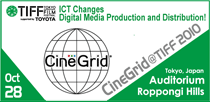2010.10.23[Event Reports]
TOKYO is the very place for unveiling TRON: LEGACY

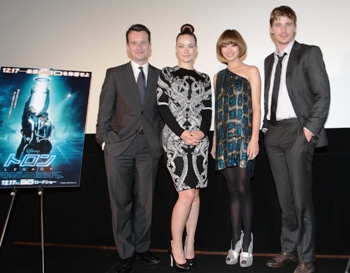
Special Screenings provides you with attractive lineups of much talked about films prior to the theatrical release. ŃĆĆ
The special footage of TRON: LEGACY (24min.) which is still in middle of the production using the most advanced 3D Screen Technology, will be released ahead of the world, titled asTRON: LEGACY 3D Special Presentation.
With in the visual footage which was screened during the stage greeting of the Producer Sean Bailey; Sam, the leading character of the film, enters into the digital world called "Grid" following the contact from his father, Flynn, who had disappeared. The footage presents Sam engaging in the deadly mortal survival in the 24min. digest. The footage ends just when Sam reunites with his father and the film is about to unfold. New dimension film with stereognostic sense and speed depicting death game of throwing discs at each other and engagement of running battle using the light circle were shown to the audiences who crowded into the theatre and excited them enthusiastically.
Following the screening, the leading cast, Garrett Hedlund and Olivia Wilde joined Bailey and the Q&A session by the three members were held and the questions were made directly from audiences to the guests of TRON: LEGACY 3D Special Presentation as the scene commonly seen in TIFF.

©2010 TIFF
Ms. Olivia spoke her thoughts, "I was very surprised like everybody else in the audience that watched the completed footage for the first time." Olivia plays Quorra the girl warrior and to the question, "Was the role preparation difficult?" she answered "I imaged Jeanne d'Arc who had both characteristics of innocent girl and the warrior. It was a role worth acting. The film depicts neo-futuristic and cool perspective of the world, and we think that Tokyo is a very place for unveiling TRON: LEGACY 3D Special Presentation.
When Garrett who plays the role of Sam was asked with the question, "Was the physical exercise to remodel your body for the fierce action scene in the film difficult?" Garrett answered, "I had plenty of training at the facility where trainers were all like ninja and I trained body flexibilities and did exercises to gain stamina." He also gave his impression on Japan as, "We just arrived last night but I thought Tokyo is a beautiful city and walking on the Green Carpet is a valuable experience."

©2010 TIFF
Following their appearance, Yu Yamada (actress), the advertising supporter of this film, made her appearance on the stage. "The advanced 3D Visuals as well as the music by Daft Punk was really cool," she expressed her feelings passionately! "Bailey gave us the inside story about the selection saying Daft Punk received the strong influences from TRON (1982) and made the approach to work on the music when they heard of this production."
TRON: LEGACY 3D Special Presentation
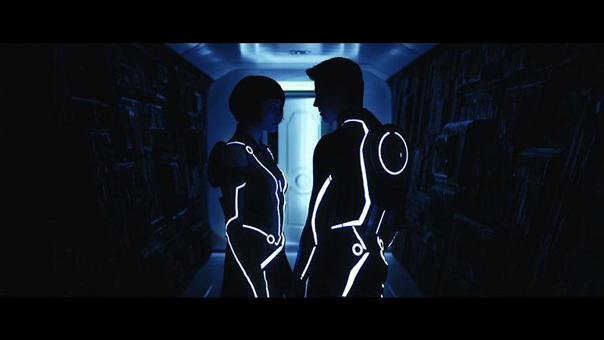
Film Information
2010.10.23[Guests]
Winds of AsiaŌĆōMiddle East 10/25 Mong-hong Chung, director of "The Fourth Portrait" will be appearing for Q&A.
Winds of AsiaŌĆōMiddle East
Taiwanese Cinema Renaissance - New Breeze of the Rising Generation
10/25 13:20 ŌĆō
TOHO Cinemas Roppongi Hills Screen5
The Fourth Portrait
Mong-hong Chung (Director) will be making appearance for Q&A session following the screening.
*Advance Tickets have been sold out.
Film Information
The Fourth Portrait
Film Information
2010.10.23[Updates]
23rd Edition of Tokyo International Film Festival will now be showing!!
There are posters of the screening titles displayed in the precincts of the venue, Roppongi Hills to enliven up the mood. We can find many people having a pleasant chat watching the posters. Here are some places around the venue that you can stop and enjoy during the Film Festival!
There is a poster gallery on the way to Roppongi Hills when you exit the entrance gate of the Tokyo Metro Hibya Line, Roppongi Station. You can tell that all the film titles have strong impact just by looking at the visuals of the posters. You'll hesitate to choose what film titles you would like to see.
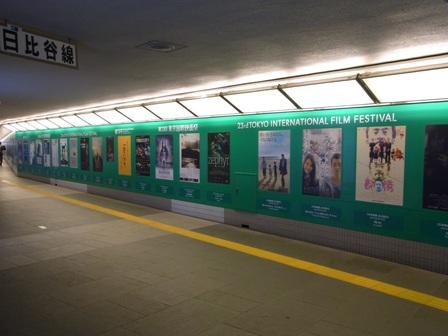
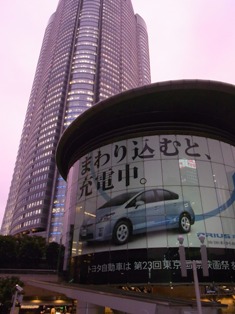
If you are coming from the Roppongi Dori, please follow the landmark, Metro Hut.
There are gigantic banners of The Social Network and The Town in Metro Hut.
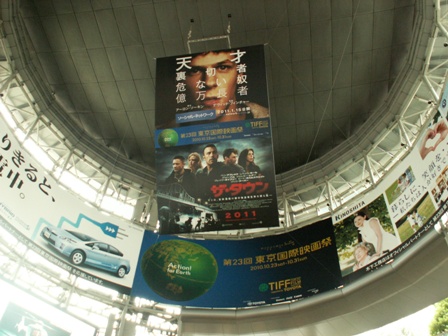
The attendant will support you with courtesy at the TIFF information booth. Please feel free to use it for convenience.
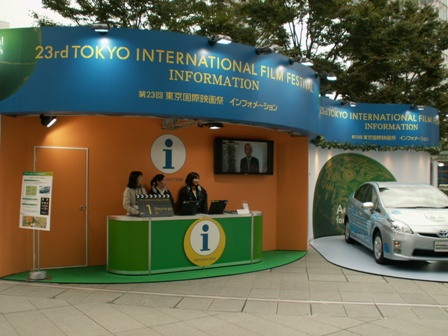
In the areaway of the 66 Plaza, there are screening titles of the film introduced here. It is fun to just gaze at it as you walk slowly down the areaway.
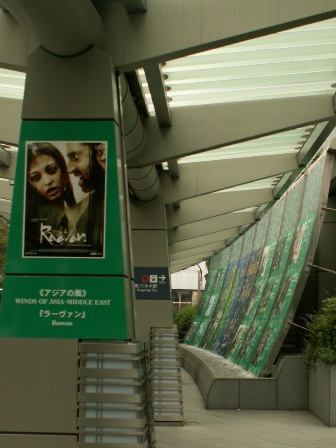
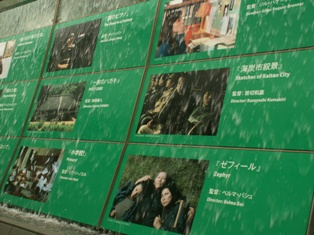
The flags are flapping in the numerous places to enliven the mood of the film festival.
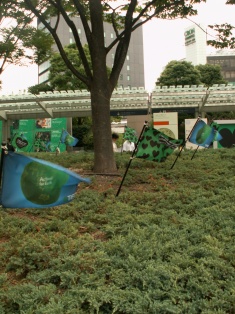
Prius Plug-In Hybrid which is the official car of the film festival for escorting the guest to the Green Carpet. Priusis an Earth friendly ŌĆ£Eco CarŌĆØ which can run in batteries. ThereŌĆÖs a chance to test drive the Prius on 10/24 (Sun) on first-come basis.!
Please see here for 24th limited Event

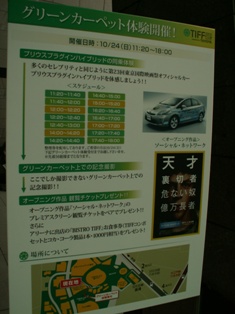
The Green Carpet under the Oyane Area. The Green Carpet walk panel is exhibited during the TIFF period.
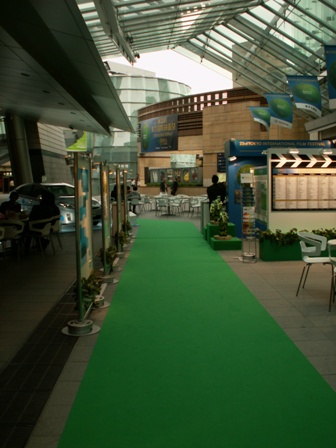
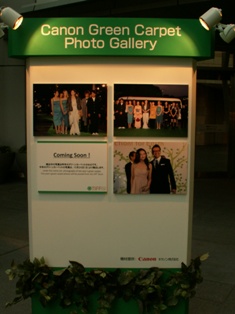
The donation bottle for the Green Charity presented by Coca-Cola Company, Limited. The unique bottle which insist on ecology is covered with green leaves.
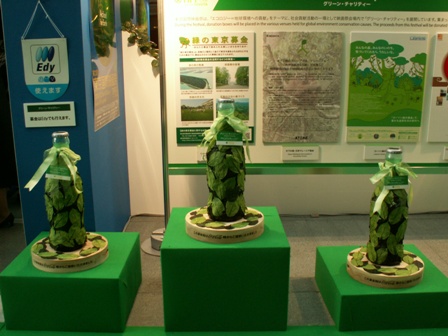
DonŌĆÖt let the chance pass you by to visit the 23rd Edition of Tokyo International Film FestivalPlease refer to the access to venue here
2010.10.22[Special Contents]
HogaHolic ├Ś JAPANESE EYES, Interview with Yoshi Yatabe, Programming Director of TIFF

The ŌĆ£faceŌĆØ of a film festival is no doubt the line-up of the films itself, while at the same time, it is no exaggeration to say that the core of a film festival, which glimmers behind the ŌĆ£faceŌĆØ, is the existence of the directors who select the films. In the interview with Mr. Yoshi Yatabe, the programming director for the Competition section since 2007, discussions were held about how a film festival should function.
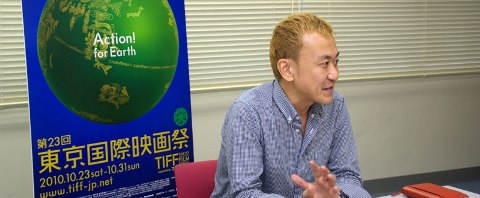
Yoshi Yatabe
He spent his childhood in Europe, then moved to Japan where he lived from junior high school through to university. After graduation, he joined a major bank, by which he was sent to France and England as an expatriate. He watched more than 300 films a year during that time, and upon his return to Japan, he decided to change his career to bring overseas films to Japan. He has been involved with film distribution and promotion since then, while producing a documentary of the late director, Makoto Sato. His involvement with a film festival began with his association with a ŌĆ£Festival du Film Francais au Japon.ŌĆØ He joined the TIFF in 2002 as a member of the festival staff. Since 2004 he has been responsible for the programming division which selects films for screening. He took up the position of programming director for the Competition section in 2007.
What is the specific role the TIFF should play?
---- It seems to me, first of all, that whether the TIFF has any distinctive characteristic has often been questioned. However, this ŌĆśŌĆØcharacteristicŌĆØ of a film festival is a difficult thing. What is your thought on this, please?
Yatabe: Just as you say, developing the characteristics of a film festival is a difficult issue. In fact, developing characteristics in itself is relatively easy. For example, you can focus on independent films, make it a celebration of young artists, and so on. It can be easily done by bringing the specialization to the fore. However, TIFF should not limit itself to that. That is why we are concentrating on how we can make it enjoyable for the visitors while taking advantage of the regional characteristics of being in Tokyo and in Asia at the moment, rather than contemplating on other characteristics.
---It is my personal opinion, but there seems to have been changes in the direction, to the better, in the last few years, especially the way you are coming forward as the programming director. The person who makes the film selection also assumes direct responsibility in delivering the films to the audience, I think this approach is very important.
Yatabe: Thank you very much. Fundamentally I love the limelight (laugh). I am genuinely pleased to hear that. I agree, it is best for the person who makes the selection to deliver them to the audience. Therefore, Q&A sessions should be hosted by the selection staff, and I host it for the Competition section myself. This means I take responsibility for the films. In other words, I want to choose films which I am prepared to stand by and I want to present to the audience.
---This sincere approach of the festival may be producing an effect. Screenings at TIFF have paved the way for more films to be shown in theatres. A Bulgarian film, ŌĆ£Eastern Play,ŌĆØ which won the Tokyo Sakura Grand Prix last year, will be shown in theatres. You would not usually see Bulgarian films, so this would not have happened without its screening at TIFF.
Yatabe: I am really encouraged with this development. In addition to the theatrical opening of ŌĆ£Eastern Play,ŌĆØ a film from the WORLD CINEMA section last year, ŌĆ£In the City of Sylvia,ŌĆØ was released in theatres in August this year for a smash hit. I agonized over this one, whether to screen it or not, because I felt I may be relying too much on my preferences. So it was a surprise to see such a good reception, and also encouraging to know there are people who are waiting for films like this. ŌĆ£Four Nights with AnnaŌĆØ was also released to theatres and became a hit after screening in the Competition section at TIFF in 2008. The director, Jerzy Skolimowski came back to TIFF the following year as a member of the jury, and this year, he delivered his new film, ŌĆ£Essential KillingŌĆØ to the WORLD CINEMA section. I value these relationships a great deal. I will continue working hard to increase opportunities like this.
---In these circumstances, what is your view on the role of a film festival?
Yatabe: Continuing on from what we were just saying, I believe the most important mission of a film festival is to show as many films as possible which are worthwhile but not yet released to theatres, to convey different charms of films by screening a wide variety of films, and eventually to broaden the audience base of film fans.
---Before we talk about Japanese Eyes section, let me ask you about the Competition this year. Do you see any particular tendency this year?
Yatabe: Every year, we try to ensure we have a variety of films. Up-and-coming young directors, world premieres, etc., we are quite greedy (laugh). If I were to mention one tendency this year, we have more films starred by established actors and films with larger scale than usual, such as ŌĆ£Brighton RockŌĆØ starring Sam Riley of ŌĆ£Control,ŌĆØ and ŌĆ£Never Let Me GoŌĆØ starring Carey Mulligan of ŌĆ£An Education.ŌĆØ I hope the program will tempt those who are not usually interested in the Competition otherwise.
---How about the two Japanese films selected for the Competition?
Yatabe: ŌĆ£Sketches of Kaitan CityŌĆØ by Kazuyoshi Kumakiri and ŌĆ£Post CardŌĆØ by Kaneto Shindo. To be honest, Kumakiri is my favorite director and I always have had high hopes for him. Without being patronizing, I felt Kumakiri has grown from a youth into a man in this film. I wanted it in the Competition the moment I saw it. With regards to Shindo, I did not choose it because he is a 98-year-old director. Please donŌĆÖt get me wrong, but I chose his film because the film is excellent. That is why it is in the Competition.
Young directors in Japan and the TIFF
------Let me ask you about the Japanese Eyes. The concept of the section changed significantly last year.
Yatabe: We have been exploring the best form for this section from the beginning so that there will be a clear distinction between Special Screenings section and Japanese Eyes section. That is why we dared to concentrate on distinguished independent Japanese films. I was nervous in my heart how this change would be received. To our great pleasure, the response turned out to be more than what we had expected, and we decided to maintain the same stance this year.
------How was the selection made?
Yatabe: Five members, including myself, viewed the films for selection. The list included about 200 films so the selection took a very long time. I was very pleased to see many young artists applied who did not really consider applying for the TIFF before. We could feel the base of the artists was expanding. It is our honor that these young talents are aware of TIFF, and we were very pleased. Having said that, the selection was made strictly from the viewpoint of being worthy for being shown at an international film festival, in the same way for other sections.
----Meaning the selection criteria remained high. What was most important in the selection?
Yatabe: What I value is whether I would like to show the film to people abroad. No matter how small-scale the story may be, it should not end as story in a closed group, but it should firmly connect with the world.
---Director Nobuhiro Suwa said in a symposium that even the most insignificant story connects with the world if you get to the bottom of it. Is that what you mean?
Yatabe: Yes. The subject can be small, but it should not restrict your thinking. I would like to see films that will broaden the perspective.
---Would you say something to young filmmakers who may be aiming at the TIFF in the future?
Yatabe: It may sound clich├®d, but I would like independent films to think outside the box. I hope to see films that are so powerful that they would surpass existing films. I welcome films with great characteristics.
---Finally, how would you like the Japanese Eyes section to evolve? I would think it would provide the best opportunity for independent films?
Yatabe: It would be my pleasure if filmmakers view it that way and make the most of the opportunity. The films will have English subtitles, so there is a chance it may attract attention of buyers and related parties from overseas. It would be brilliant if it becomes the staging point for the new Japanese talent to spread their wings around the world.
HogaHolic ├Ś JAPANESE EYES(Japanese site)

2010.10.22[Event Information]
"Filmmaker's Angle" - Conference & Guest Announcements

Relish the talk show by your favorite cineasts and the screening of your memorable film titles.
FilmmakerŌĆÖs Angle - The World of Kyoko Koizumi
Date: 10/23(Sat) 22:00- Conference

Venue: TOHO CINEMAS ROPPONGI HILLS SCREEN7
Special Feature Appearance
Speaker
Kyoko Koizumi
Guests
Kiyoshi Kurosawa (Director)
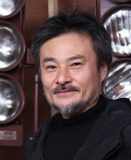
Director Kiyoshi Kurosawa who helmed the TOKYO SONATA starring Kyoko Koizumi.
Yu Koyanagi (Actor)
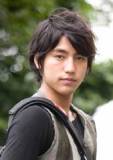
Actor Yu Koyanagi who appears in TOKYO SONATA starring Kyoko Koizumi.
Makoto Wada (Director)
Director Makoto Wada who helmed RUBY, THE THIEF starring Kyoko Koizumi.
Hiroshi Machida (Cinematographer)
Cinematographer Hiroshi Machida of Kaza-hana starring Kyoko Koizumi
Screening Films
RUBY, THE THIEF (1988)
Director: Makoto Wada, Cast: Kyoko Koizumi, Hiroyuki Sanada, etc.
(No English subtitles)
Kaza-hana (2000)
Director: Shinji Somai, Cast: Kyoko Koizumi, Tadanobu Asano, etc.
(No English subtitles)
TOKYO SONATA (2008)
Director: Kiyoshi Kurosawa, Cast: Teruyuki Kagawa, Kyoko Koizumi, etc.
(No English subtitles)
FilmmakerŌĆÖs Angle - The World of Yohei Taneda
Date: 10/29 (Fri) 22:00 ŌĆō Conference

Venue: TOHO CINEMAS ROPPONGI HILLS SCREEN2
Special Feature Appearance
Speaker
Yohei Tanedai
Guests
Lee Chi-Ngai (Director)
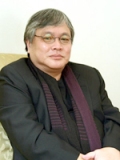
Su Chao-Pin (Director)

Su Chao Pin's Message
Chiaki Kuriyama (Actress)

Actress Chiaki Kuriyama of Kill Bill: Vol.1 who worked with Mr. Taneda
Sinya Kawai (Producer)
Producer Sinya Kawai of Swallowtail Butterfly who worked with Mr. Taneda
Masayuki Tanashima (Producer)
Producer Masayuki Tanashima, the Advertising Executive of Swallowtail Butterfly and SLEEPLESS TOWN who worked with Mr. Taneda
Koko Maeda(Producer)
Screening Titles:
SLEEPLESS TOWN (1998)
Production Designer: Yohei Taneda
Director: Chi-Ngai Lee, Cast: Takeshi Kaneshiro, Mirai Yamamoto, etc.
(No English subtitles)
Silk (2005)
Production Designer: Yohei Taneda
Director: Su Chao-Pin, Cast; Chen Chang, Yosuke Eguchi, etc.
(No English subtitles)
Kill Bill: Vol. 1 (2003)
Production Designer: Yohei Taneda
Director: Quentin Tarantino, Cast: Uma Thurman, Chiaki Kuriyama, etc.
FilmmakerŌĆÖs Angle - The World of Rintaro
10/30 (Sat) 22:00 - Conference

Venue: TOHO CINEMAS ROPPONGI HILLS SCREEN2
Special Feature Appearance
Speaker
Rintaro
Guests
Katsuhiro Otomo (Director)
Character Designer of Harmagedon: Genma taisen and Scriptwriter of METROPOLIS
Toru Furuya (Voice Over Artist)

Mr. Furuya plays Joe Higashi of Harmagedon: Genma taisen
Ryudo Uzaki (Musician)

Uzaki wrote Music of The Dagger of Kamui
Sunao Katabuchi (Director of Photography)
Cinematographed Mai Mai Miracle
Screening Titles:
Harmagedon: Genma taisen(1983)
Production Company: Haruki Kadokawa, Shotaro Ishinomori, Character Designer: Katsuhiro Otomo,
Director: Rintaro, Cast: Toru Furuya, Mami Koyama, etc.
(No English subtitles)
The Dagger of Kamui (1985)
Production Company: Haruki Kadokawa, Original Music by Ryudo Uzaki, Eitetsu Hayashi,
Director: Rintaro, Cast: Hiroyuki Sanada, Mami Koyama, etc.
(No English subtitles)
METROPOLIS (2001)
Original Comics: Osamu Tezuka, Screenplay: Katsuhiro Otomo,
Director: Rintaro, Cast: Yuka Imoto, Kei Kobayashi, etc.
(No English subtitles)
For details please refer to Bunka-Cho Film Week PR Site (Japanese site)
Please note that the stage appearances of guests and scheduled closing time of the show may change according to circumstances
For Ticket Purchase
Ticket Pia
l-tike.com
2010.10.22[Updates]
TSUTAYA TOKYO ROPPONGI is displaying TIFF Special Feature!
DVD related to 23rd TIFF films are displayed boldly on the wall by the interior escalator in the DVD / Rental Corner on the second floor!!

©2010 TIFF
From the Opening Film title, The Social Network,, to the Closing Film, The Town, Winds of AsiaŌĆōMiddle East MOSS, Japanese Eyes - Opening Film Wandering Home. The shoppers can check the DVD related to 23rd TIFF at one glance! You can surely find the various films of your favorite directors who's films are featured in TIFF!! This will be an excellent prepping before visiting the Film Festival screenings!

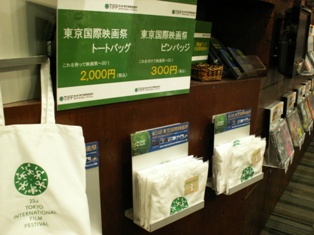
©2010 TIFF
Starting with the 21st edition of the TIFF which was held two years ago, TSUTAYA TOKYO ROPPONGI has been setting up the special exhibition corner during the Film Festival period simultaneously.
By establishing this Special Corner, TSUTAYA TOKYO ROPPONGI hopes to become a place that would attract the film audiences to become a place that would attract the film audiences to visit the Tokyo International Film Festival via the shop and also aspires to enliven the TIFF along with the city of Roppongi.
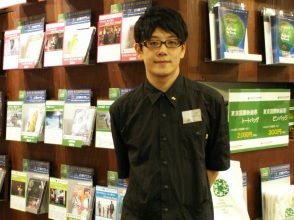
©2010 TIFF
This year, TSUTAYA TOKYO ROPPONGI not only decorated the special board on the 2nd Floor by the escalator but also established the special corner for the Tokyo International Film Festival at the Rental Corner as well!!
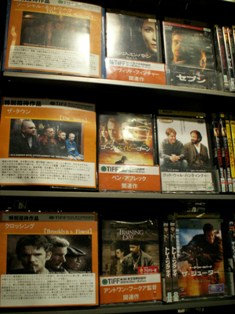
Don't miss the chance to visit TSUTAYA TOKYO ROPPONGI during the Film Festival Period of 10/23 ŌĆō 10/31 as well as when you are planning to visit Roppongi.
TSUTAYA TOKYO ROPPONGI
Shop Info. (Japanese site)
2010.10.22[Updates]
Aoyama Book Center showcases books related to Tokyo IFF
Business hours for the stores are until 5 AM in the morning, Aoyama Book Center: Roppongi Branch is showcasing the original novels and books related to the 23rd Tokyo International Film Festival!
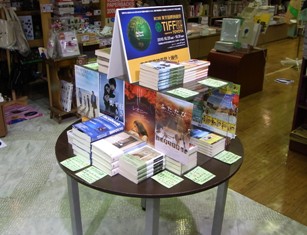
©2010 TIFF
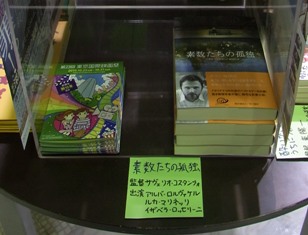
©2010 TIFF
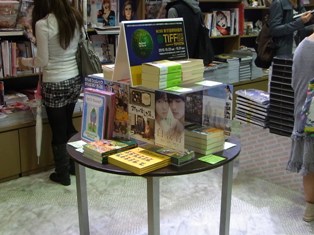
©2010 TIFF
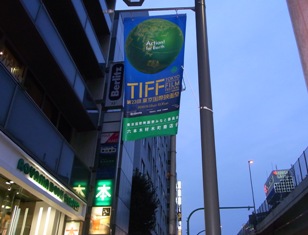
©2010 TIFF
Aoyama Book Center: Roppongi Book Store
Branch Stores Info here (Japanese Site)
Aoyama Book Center is also in Roppongi Hills as well!
Branch Stores Info here (Japanese Site)
Please come and visit us some time!
2010.10.21[Guests]
Important Notice: Stage Appearance of Mong-hong Chung, director of "The Fourth Portrait" scheduled on 10/25 has been cancelled
"Taiwanese Cinema Renaissance: New Breeze of the Rising Generation"
10/25 ’╝łMon’╝ē 13:20-
TOHO CINEMAS ROPPONGI HILLS SCREEN5
The Fourth Portrait
Please be forewarned that Mong-hong Chung (Director) who was scheduled for the stage appearance has been cancelled due to the unforeseen reason.
Therefore the Q&A session after the show has been canceled.
The film title, The Fourth Portrait will be screened on October 25 (Mon) as scheduled.
We would like to make our most sincere apology for any inconvenience this may cause you. We kindly ask you to be forewarned regarding to this matter.
The Fourth Portrait
Film Information
2010.10.21[Event Information]
Announcement: Press Conference schedule of Competition films.
The 15 outstanding films compete for Tokyo Sakura Grand Prix.
The Press Conferences will be held at "TIFF movie café"(located Roppongi Hills 2F) where general public are able to see the directors, actors and so on.
This is a great opportunity to directly hear those filmmaker's intentions and background of the film.
Please be a part of this event while relaxing and having some coffee or TIFF original drinks.

Scheduled Press Conference of Competition Films
Ō¢Ā10/24 ’╝łSun’╝ē
14:00’Į×14:30ŃĆĆZephyr
Ō¢Ā10/25 ’╝łMon’╝ē
15:15’Į×15:45ŃĆĆPrimary!
Ō¢Ā10/26 ’╝łTue’╝ē
14:00’Į×14:30ŃĆĆSarah's Key
15:45’Į×16:15ŃĆĆFlamingo No.13
16:45’Į×17:15ŃĆĆBuddha Mountain
Ō¢Ā10/27 ’╝łWed’╝ē
16:00’Į×16:30ŃĆĆIf the Seed Doesn't Die
17:00’Į×17:30ŃĆĆAnd Peace On Earth
Ō¢Ā10/28 (Thu’╝ē
13:00’Į×13:30ŃĆĆPiano in the Factory
14:00’Į×14:30ŃĆĆBeautiful Boy
Ō¢Ā10/29 ’╝łFri’╝ē
14:15’Į×14:45ŃĆĆBrighton Rock
15:15’Į×15:45ŃĆĆIntimate Grammer
16:15’Į×16:45ŃĆĆInvisible Eye
* Please note that the Press Conference of POST CARD is still under planning.
2010.10.21[Special Contents]
HogaHolic ├Ś JAPANESE EYES, Roundtable: Tetsuaki Matsue of ŌĆ£Live TapeŌĆØ x Natsuki Seta of ŌĆ£A Liar and a Broken GirlŌĆØ x Koji Fukada of ŌĆ£hospitalit├®ŌĆØ

The Japanese Eyes section had a change of direction in 2009, which may be viewed as ŌĆ£independent films declaration.ŌĆØ This was symbolized by the news that Tetsuaki MatsueŌĆÖs ŌĆ£Live TapeŌĆØ won the Best Picture in Japanese Eyes. Hence, a talk has been arranged with Tetsuaki Matsue, and two new comers to the TIFF, Natsuki Seta and Koji Fukada. The three have not met before, but they are from the same generation in their early 30s, being in the same era and breathing the same air. What are the real opinions of these young directors? Frank discussions were held about the value of a film festival to them and their passion for filmmaking.
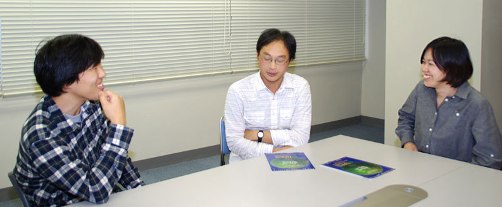
Tetsuaki Matsue:Profile
Born in Tokyo in 1977. His graduation work from Japan Academy of Moving Images, ŌĆ£Annyong Kimchee,ŌĆØ won various awards including the Special Mention in the New Asian Currents Awards at Yamagata International Documentary Film Festival, Special award at NETPAC (Network for the Promotion of Asian Cinema) and Bunka-cho Film Awards in 2000. Since then he has released exciting films one after another, including the ŌĆ£Honto ni atta noroi no videoŌĆØ series, ŌĆ£Every Japanese Woman Makes Curry RiceŌĆØ, ŌĆ£Seki-LalaŌĆØ, ŌĆ£THE Virgin wildsidesŌĆØ a.k.a. ŌĆ£Dotei wo ProduceŌĆØ and ŌĆ£Annyong Yumika.ŌĆØ His ŌĆ£Live Tape,ŌĆØ which was filmed on January 1, 2009, won the Best Picture in the Japanese Eyes section at TIFF 2009. (The film is currently doing the rounds at film festivals around the world, such as in Germany, NY, Toronto, and Paris.) He published, ŌĆ£Self Documentary,ŌĆØ which summarizes his life in the last 10 years.
Natsuki Seta
Profile & Message
Koji Fukada
Profile & Message
Young directorsŌĆÖ thoughts on film entry for festivals.
---Since you are all film makers from the same generation, I would like you to exchange opinions on various matters. If I include films that you made while at school, all of you have experience in independent films and film festivals. What is the significance of films festivals to you?
Matsue: To me, film festivals ŌĆ£add value to films.ŌĆØ Japanese films from the end of 1980s to early 1990s are often referred to as a stagnant period. On the other hand it was when Takeshi Kitano came to the scene and Kiyoshi Kurosawa began releasing a series of V cinemas (films aimed specifically at video market without theatre release), and there was a trend where edgy films were ŌĆ£recognized abroad which then led to a theatrical release.ŌĆØ That is how I started to watch independent films, and it really impressed me. Takashi IshiiŌĆÖs ŌĆ£Shinde mo ii,ŌĆØ for example, was absolutely mind blowing. I could not believe someone was making such an interesting film. It was like the fog had lifted, film festivals made me realize there is always a film that is worthwhile.

Fukada: Following on from what Matsue has just said, I am certainly conscious of some sort of a brand value of film festivals. I have always been independent, and my films do not have any known actors nor directed by a famous director (laughter). If I donŌĆÖt do anything, no one will be interested in my film and it wonŌĆÖt see the light of the day. I would like to gain a foothold through film festivals to develop my next film, so film festivals are significant to me.

Matue:Independent filmmakers are especially conscious of that. Since I became a film maker and joined the side to enter films, I have been very conscious of film festivals. The film festival I participated in for the first time was KOPAN YF 10 years ago with my debut work, ŌĆ£Annyong Kimchee.ŌĆØ I was still at Japan Academy of Moving Images at that time, and I was aiming for a theatrical debut, so I was conscious somewhere in my mind to gain a foothold through film festivals. It was my understanding at that time, and also in the Japanese film industry, I believe, that it is difficult for independent films to have theatrical debut without adding some value. Nowadays I think even student films can have a theatrical debut if the quality is high.
Fukada: There is one more thing I have been sensing lately. I have been invited to and participated in various film festivals overseas for the last few years, and I can feel for real that film making is moving with film festivals as its starting point. The competitiveness of the country in the world film market is almost decided at film festivals. Including myself, I would like the Japanese film industry to pay more attention to this.
Seta:I am not as experienced in film festivals as you two, and I havenŌĆÖt got a clear idea yet about their significance to me. However, I think, films which are shown at theatres have various information released in advance, and people who feel interested go to theatres to watch them. At film festivals, on the other hand, people tend to watch films without so much advance knowledge. ŌĆ£A Liar and a Broken Girl,ŌĆØ for example, has just been completed last month, and the visitors to the TIFF will be its first audience. I think it is only possible at film festivals for films to be watched in such circumstances, and such opportunities are important for filmmakers, as well as for the films.

---What have been your views for the TIFF?
Matsue: I was a keen regular when I was at high school. I was one of those people who looked forward to TIFF every year. TIFFŌĆÖs significance grew even more in 2006 when I became one of the jury members for ŌĆ£Winds of Asia-Middle East.ŌĆØ I was making adult videos at the time, and these videos were recognized and Sozo Teruoka, the then programming director of the Competition section asked me to join. I have complete trust in Mr. Yatabe (the current programming director of the Competition section) and other members of the staff of the TIFF. It may be so in everything, but what matters essentially in film festivals is the ŌĆ£people.ŌĆØ TIFF is big and influential, so it also attracts vilifications and criticism. When my ŌĆ£Live TapeŌĆØ was selected for the Japanese Eyes section, some people asked me why I entered my films in the TIFF.
---It implies that, being an independent filmmaker, you should refuse it being anti-establishment, doesnŌĆÖt it?
Matue:Yes. But someone I trust recognized the film, so to me, it was only natural to enter the film. I was genuinely pleased.
---Ms. Seta and Mr. Fukada, this is your first time to participate in TIFF. Have you had any particular feeling about TIFF?
Seta: I have been a regular visitor for the last few years. I thought it was ŌĆ£money well spentŌĆØ for being able to watch films which may not be shown anywhere else, with the added bonus of Q&A Sessions, etc., and I enjoyed it. But I was not an enthusiastic fan. So I am really surprised. When ŌĆ£A Liar and a Broken GirlŌĆØ was still being made, there was someone I did not know. It remained a mystery until a moment ago ŌĆō it was Mr. Yatabe. (Note: Mr. Yatabe, the programming director came for greetings just before the talk.) Looking back, he must have been aware of my work for some time. I am really surprised.
Fukada: Same for me. Whatever is said, TIFF is the largest film festival in Japan, and I did not think they would pay any attention to someone nameless like me, so I was surprised. To be honest, I did not come to TIFF that much. Buying tickets looked complicated, and also I thought that I would be able to watch TIFF films at art houses later on. However, I am bracing myself for participating on the side of the filmmakers. I am not flustered so much at film festivals outside Japan because I donŌĆÖt understand whatever they say, but this one is in Japan, and I cannot escape, or I cannot make excuses. This is the biggest ever platform for me to release my film, and assessments and feedback will be bounced back to me. I am feeling quite a lot of pressure.
Seta: I am anxious about it, too. Also, my friends and relatives have been jeering me since the selection, asking me when it will be shown at Roppongi Hills or whether I am going to walk on the Green Carpet.
Matsue: I had a lot of that, too, last year. ŌĆ£Matsue is going to walk on the Green Carpet.ŌĆØ (laugh)
Seta: I am nervous already (laugh).
Fukada: It may sound odd, but some people say itŌĆÖs more amazing than a theatrical debut because there are some people who will pay attention to a film because it has been shown at the TIFF.
Three different views of films, and the ideal film making
---I would like to ask about the two films which have been selected for the Japanese Eyes section. Which one shall I start with?
Fukada: I am scared of other peopleŌĆÖs views (laugh). Please start with mine because I want to get it done and over with.
---LetŌĆÖs start with Mr. FukadaŌĆÖs ŌĆ£hospitalit├®.ŌĆØ If you donŌĆÖt mind me telling you what I felt first, I sensed it has very classical atmosphere of Japanese films. It reminded me of films like Yasujiro OzuŌĆÖs.
Fukada: Well, I am influenced by Japanese films before the 1960s. I divide the era before and after Yasuzo Masumura. I looked at Mikio Naruse, rather than Ozu in this film.
---What made you conscious of it in making the film?
Fukada: Recent films seem to emphasize the emotional interaction between people, but I wondered if I can have a story just with the circumstances and the air at the time. Naruse scooped up Japanese communications well and constructed a story with it. That is why I was conscious of him.
Matue: Now I understand. I felt characters were not moving, but the setting was pursuing the characters. There were many things which bothered me, for example, why the wife is so young and pretty? But the story went ahead regardless, which was interesting to me, and I felt the challenge the film was making.
Seta: I felt the film was poised and attention was paid to details, unlike my film. There were also some fun scenes, hard to describe, like gags, for example, there was a cut suddenly where a naked woman was looking through the window, and there was a parakeet called Pi-chan. I got hooked with these. There were some long takes when it counted, which made me reflect on myself, wanting to be able to shoot as solidly as he.
---Mr. Fukada, I believe you value the atmosphere and circumstances rather than emotions that are created in human interaction. What is the reason for this?
Fukada: I value the impressions at the time the film is delivered. I would like to make films that will be slowly reflected upon a few days after the viewing, rather than the enjoyment there and then. In this regard, I feel human emotions are only for that particular time, but the experience through the relationship can remain in the memory. That is why I place emphasis to show the relationship of the characters rather than their emotions.
---Shall we talk about Ms. SetaŌĆÖs ŌĆ£A Liar and a Broken GirlŌĆØ?
Matsue: When I saw Ms. SetaŌĆÖs short film, I felt straight away that she can make commercial films. My impression, having watched this film, is that she really aimed high by making a debut with such a grand feature film
Seta: It was really high.
Matsue: It is really difficult to show a story which contained such cruelty with a pop and rom-com touch like this. To be honest, I have not digested it fully even now. In fact, I am not good at this kind of story, regardless of Ms. SetaŌĆÖs direction. Just like the film, I had a dream of being kidnapped. I havenŌĆÖt had such a scary dream for a long time.
Fukada: That means the film has had significant impact on you in a way.
Matsue: Indeed. It is deeply stuck in my mind that is why I cannot really assess it with a clear mind.
Seta: Well, to be honest, I was not sure how to tackle this topic when I was asked about this story. As Mr. Matsue pointed it out, I struggled to see what distance I should keep for the story to work. It was extremely difficult to balance the weight of the past and the lightness of now. I wanted to make it as a love story between the two protagonists in the end, and made this film based on this belief. I made the last scene in that form to include one of my messages there.
Fukada: It is based on a ŌĆślight novelŌĆÖ but novels of that type sometimes have hard-to-take issues despite the pretence of a rom-com on the surface. Having watched Ms. SetaŌĆÖs film, I felt it was extremely hard to adapt it to a film. At the same time, I thought the contemporary generation may be able to settle in to something like this, considering it is post-ŌĆ£Evangelion.ŌĆØ Also, I love Ms. SetaŌĆÖs direction, or the almost choreographed movements. The rhythm makes me feel good. I kept wondering how this was done. I donŌĆÖt have such a sense at all so I am envious.
Seta: I told them what movements I wanted in detail. I am always asking actors, for example, to jump a little bit, though it was not like that in the past. It is still trial and error at the moment.
Fukada: You used wires.
Seta: I did everything in this film which was difficult in student films, like hanging and flying in the air.
---I wonder what kind of responses would Ms. SetaŌĆÖs film and Mr. FukadaŌĆÖs receive when they are screened at the TIFF.
Matsue: All sorts of opinions are expressed at film festivals. ItŌĆÖs scary.
Seta: It is really scary.
Fukada: ItŌĆÖs half expectant and half scared for me.
---You will be leading the Japanese film industry in the future. Would you mind telling me about the film making you are aiming for at the end?
Matsue: I think films are live experiences, and experiences remain in your body. So I think hard how viewers can participate in my film and experience it. I want to make films which do not betray that. I should not betray expectation of the people who paid to watch my film. My theme may be how to make viewersŌĆÖ experience richer.
Fukada: I am sceptical about current trend in Japanese films, which construct stories by getting the characters to tell their feelings and circumstances in detail. Films can work without the characters saying or doing funny things, and I want to make films like that. In addition, I want to be brave and show my perspective of how I am viewing the world. Considering the necessity of films, I believe films provide opportunities for both audience and the filmmakers to know that there are different sets of values than your own. It may be getting blown out of proportion, but it means to be aware of the diversity, and even more, this may help creating a new type of democracy. That is why I intend to be always aware of my view of the world.
Seta: I believe films have power to show you the world which you have not even imagined, to broaden your thinking, and to introduce the world you did not know about. After viewing a film, you may walk differently, or the scenes around may look different, I want to make films like that. Mr. MatsueŌĆÖs ŌĆ£Live TapeŌĆØ was just like that to me.
Matsue: Thank you very much.
HogaHolic ├Ś JAPANESE EYES(Japanese site)


